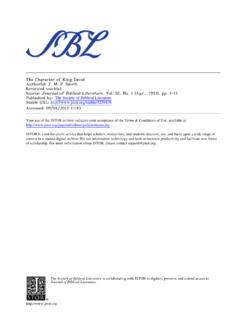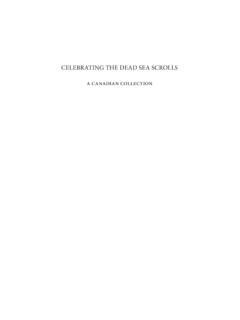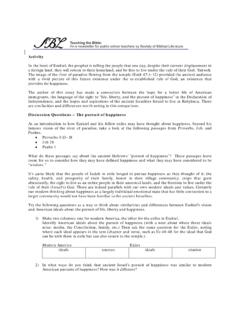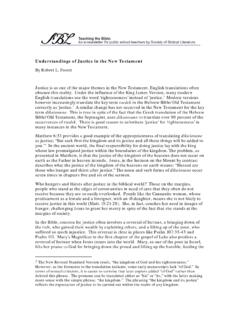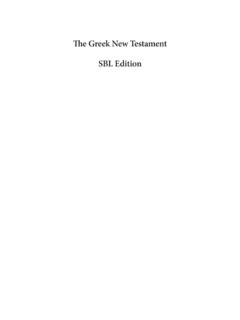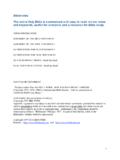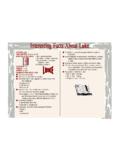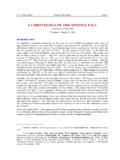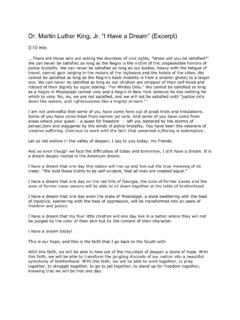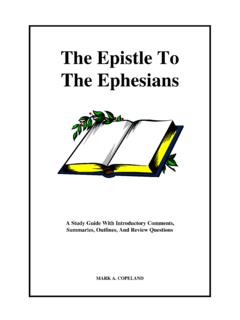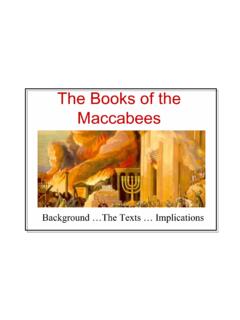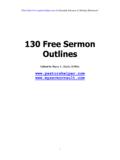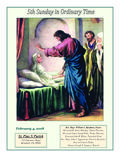Transcription of The Maccabean Revolt: Between Tradition and History
1 1 The Maccabean revolt : Between Tradition and History By Steven H. Werlin In modern Judaism, the holiday of Chanukah celebrates the victorious revolt of the Jews against the Seleucid Greeks in 167-164 BCE ( before the common era = BC). Today we refer to these events as the Maccabean revolt , named after the Jewish leader, Judah Maccabee. Like many biblical episodes, the story begins with a dramatic struggle against hatred and tyranny, and it ends with a miracle. The Story of Chanukah As the tale is told, it was a time of injustice and persecution. The empire of the Seleucids stretched throughout Syria and southward into Judaea, the region surrounding Jerusalem.
2 Jewish customs, such as the teaching of Torah and the practice of circumcision, had been outlawed, while the holy Temple in Jerusalem had been defiled with the sacrifice of swine, an unclean animal. The Seleucid king, Antiochus Epiphanes whose self-given nickname means the manifest-god had decreed that the Jews worship the Greek god, Zeus, rather than the God of Israel. Enter Matthias, a pious Jew from the village of Modi in, just outside Jerusalem. When one of his countrymen succumbed to the will of the maniacal king and sacrificed to Zeus, Matthias rose up and killed the apostate. He then fled to the wilderness of Judaea, along with his five sons. It was not long before Matthias, a very old man at the time, died.
3 His bravest son, Judah, took up his father s cause and led the Jewish people in a revolt against Antiochus Epiphanes. His strength as a warrior and leader earned Judah the nickname the Hammer, or in Hebrew, Maccabee. Despite the odds, Judah Maccabee and his passionate band of freedom-fighters triumphed over the massive Seleucid army of Antiochus Epiphanes. Following their initial victories, the Jews retook Jerusalem and its holy Temple. Judah and his followers purged the Temple precinct of all remnants of the foreign gods and their sacrifices. Then they rededicated the Temple to the God of Israel. (The word Chanukah means rededication, in reference to the Jerusalem Temple.)
4 In order to reestablish the daily sacrifices in the Temple, the priests had to light the holy menorah, a seven-branched candlestick that provided light and stood 2as an important symbol within the sanctuary. In this part of Titus' triumphal procession (from the Arch of Titus in Rome), the treasures of the Jewish Temple in Jerusalem are being displayed to the Roman people. Hence the Menorah. (from Wikipedia, ) Supplies in the rededicated Temple were scarce however and there was not enough oil to keep the flames of the menorah burning beyond a single day. It would take eight days before additional oil could be obtained, but despite the delay, the tiny amount of oil kept the flames of the menorah burning for all that time.
5 So, the miracle was two-fold: An unlikely victory over an insurmountable enemy, and the preservation of the menorah s oil to enable the continuation of the Temple sacrifices. Countless generations of Jews have commemorated these events with the annual festival of Chanukah. Each household lights their own menorah, or more properly a hanukiyah (a nine-branched candlestick used only on Chanukah) for eight days, while enjoying oil-based foods like doughnuts and latkes (potato pancakes fried in oil). Behind the Legend Traditional histories tend to view ancient events in black-and-white, right-and-wrong, Judah Maccabees and Antiochus Epiphaneses. But real life is rarely so neat.
6 As the saying goes, there are two sides to every story, but History is written by the winners. So, when we study History , it is important to look at the information that has been passed down to us with a critical eye. How can we get to the historical reality behind this traditional tale? What sorts of critical questions can we ask about the story? In any study of ancient History , we should consider our sources. Where does this story come from? For those who grew up in a Jewish household, perhaps the story was told by one s parents or grandparents. Historians call this the oral 3tradition: The story is told over and over again as it is passed down from one generation to another.
7 But if you ve ever played the game Telephone you know that the details tend to change slightly with each re-telling. Perhaps the heroes of the story and the victories are embellished, while the villains are increasingly vilified. Luckily, in addition to oral Tradition we have ancient Jewish literature. The Books of the Maccabees specifically First and Second Maccabees were written in the 2nd century BCE, within a few decades after these events took place. These are distinct accounts written by different authors. They are not included in the Jewish Bible, but they are included in the Catholic Bible and the biblical canons of the Eastern Orthodox Churches. The early Christians preserved these Jewish texts written centuries earlier which many scholars believe attest to the events of the Maccabean revolt .
8 Similar to the traditional tale though, the books of First and Second Maccabees portray Judah and his followers as heroes and Antiochus Epiphanes as unreasonably cruel. The authors of these books were themselves Jews, so the passionate national pride expressed should not come as a surprise. All historians of course both ancient and modern have some bias. Nowadays historians try to overcome those biases and present only the facts as best they can. But in the ancient world, this was not usually the case. Rather than simply recording facts, ancient historians wrote to entertain, make an argument, or, in the case of First and Second Maccabees, glorify people and events.
9 Nevertheless, there are occasional hints throughout the Books of the Maccabees of a much more complex reality. For example, we read that certain renegades came out from among [the people of] Israel and misled many, saying Let us go and make a pact with the gentiles [ non-Jews] around us.. So they built a gymnasium in Jerusalem according to the Gentile custom, and removed their marks of circumcision, and abandoned the Holy Covenant with God. They joined with the gentiles and sold themselves to evil (1 Macc. 1:11-5). Apparently some Jews were eager to adopt the Greek customs. The author refers to these Jews as renegades who misled other Jews; his choice of words portrays them as evil -doers.
10 Here History goes beyond just the facts. It is of course always much easier to label what is evil and what is righteous in hindsight. In the generation after the revolt , the authors of First and Second Maccabees labeled anyone who had followed Judah and his family the righteous, and anyone who had not, the evil. These labels however are dependent on one s point-of-view. For those Jews who apparently fought alongside the Seleucids, this was not a revolt , but a civil war. From the viewpoint of the renegades, they were right, and Judah Maccabee and his followers were the hateful and intolerant ones intolerant of Greek practices, that is.
